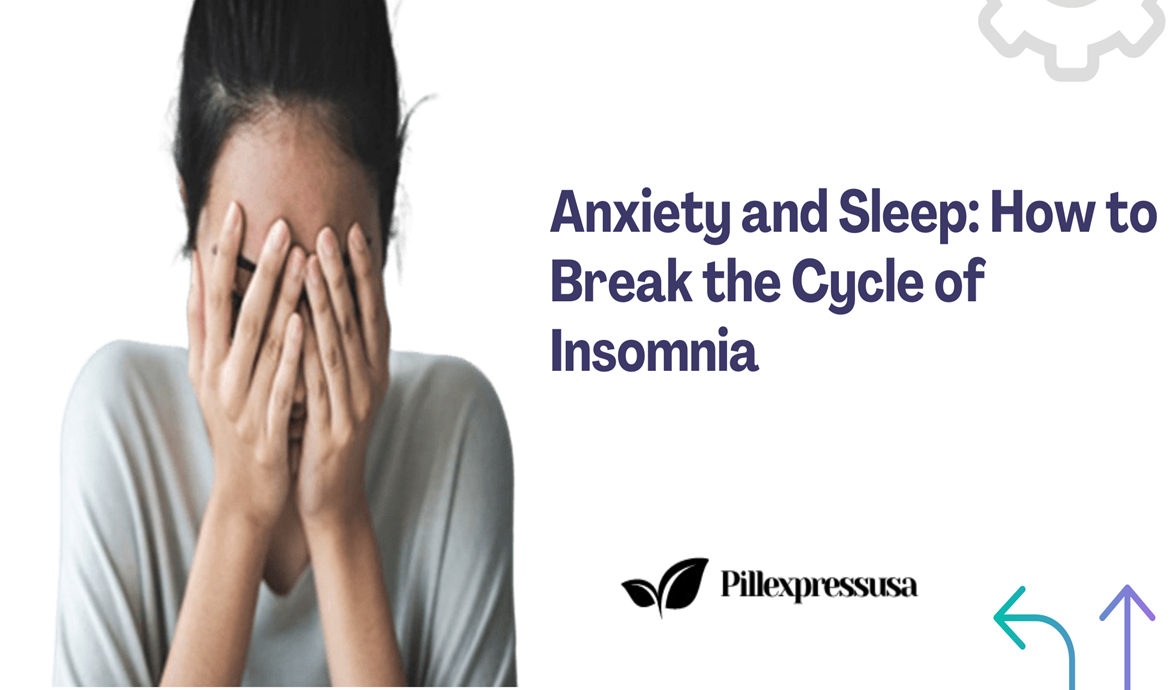Introduction
Insomnia and anxiety often create a self-perpetuating cycle where each condition worsens the other. Breaking this cycle can be difficult, especially if you’re unsure of how to start. To effectively tackle both insomnia and anxiety, it’s crucial to address and manage the symptoms of each.
In this article, we’ll delve into the relationship between sleep and anxiety and explore both natural treatment methods and medications like Xanax and Alprazolam. These FDA-approved options, available online, can be effective in treating anxiety-related sleep issues. We will provide a detailed overview of these medications and discuss their uses. Continue reading to find out more.
The Link Between Anxiety and Insomnia
How Anxiety Affects Sleep:
Anxiety often leads to overactive thoughts, persistent worry, and a heightened state of alertness, making it hard to relax and fall asleep. Individuals with anxiety disorders commonly face sleep problems such as difficulty falling asleep, frequent awakenings, or waking up too early.
The Role of Stress Hormones:
Anxiety triggers the release of stress hormones like cortisol, which can disrupt the body’s natural sleep-wake cycle. Elevated cortisol levels at night can interfere with sleep patterns and reduce sleep quality.
How Poor Sleep Influences Anxiety:
Insufficient or poor-quality sleep can exacerbate anxiety symptoms. Lack of sleep can heighten emotional reactivity, increase irritability, and impair cognitive function, making it more challenging to manage anxiety.
Strategies to Break the Anxiety-Insomnia Cycle
Stick to a Regular Sleep Schedule:
Maintain a consistent sleep routine, even on weekends, to help regulate your internal clock and improve sleep quality.
Develop a Calming Bedtime Routine:
Engage in relaxing pre-sleep activities such as taking a warm bath, reading a book, or practicing relaxation techniques like deep breathing or meditation. Avoid stimulating activities like watching intense TV shows or using electronic devices.
Enhance Your Sleep Environment:
Create a comfortable sleep setting with a supportive mattress, soft pillows, and a dark, cool room to promote better sleep.
Limit Caffeine and Alcohol:
Minimize caffeine and alcohol intake, especially in the evening, as these substances can disrupt sleep and worsen anxiety.
Address Anxiety Through Therapy:
Consider therapies such as cognitive-behavioral therapy for insomnia (CBT-I) or cognitive-behavioral therapy for anxiety (CBT). These therapies can help develop effective strategies for managing anxiety and improving sleep.
Engage in Regular Exercise:
Regular physical activity can help alleviate anxiety and improve sleep quality. Aim for at least 30 minutes of moderate exercise on most days, but avoid vigorous exercise close to bedtime.
Practice Mindfulness and Relaxation Techniques:
Techniques like mindfulness meditation, progressive muscle relaxation, or yoga can help calm the mind and reduce anxiety, especially before bed.
Limit Screen Time:
Reduce exposure to blue light from screens in the hour before bedtime, as it can interfere with melatonin production and disrupt sleep.
Adjust Your Diet:
Avoid heavy or spicy meals close to bedtime, as they can cause discomfort and interfere with sleep. Opt for light, easily digestible snacks if needed.
Seek Professional Advice:
If insomnia and anxiety persist, consult a healthcare provider or sleep specialist. They can evaluate your condition, offer treatment options, and discuss potential medications.
Medications for Anxiety-Related Insomnia
Xanax (Alprazolam):
Xanax is a benzodiazepine used to treat anxiety and panic disorders. It can help with anxiety-related insomnia but is not typically recommended solely for sleep issues due to the risk of dependence and side effects. Xanax enhances the effects of GABA, a neurotransmitter that promotes relaxation.
Alprazolam:
Similar to Xanax, Alprazolam is prescribed for anxiety disorders and sometimes for anxiety-related sleep problems. It should be used cautiously and for short periods due to the risk of dependence and withdrawal.
Diazepam (Valium):
Diazepam, another benzodiazepine, is used for anxiety and can indirectly assist with insomnia through its calming effects. It is not usually prescribed specifically for sleep disorders.
Valium:
Valium is the brand name for Diazepam. It helps reduce anxiety, which may indirectly improve sleep.
Ambien (Zolpidem):
Ambien is a sedative-hypnotic used specifically for treating insomnia. It helps people fall asleep and stay asleep by affecting brain chemicals. Ambien is not used to treat anxiety.
Warnings and Precautions
Prescription Requirement:
Use these medications only under the guidance of a healthcare professional.
Avoid Alcohol:
Alcohol can enhance the sedative effects and impair judgment when combined with these medications.
Dependence and Addiction:
Benzodiazepines carry a risk of dependence and addiction. Adhere to the prescribed dosage and duration.
Tolerance:
Over time, higher doses may be needed for the same effect, potentially leading to increased dependency.
Withdrawal Symptoms:
Discontinue use gradually under medical supervision to avoid withdrawal symptoms.
Drowsiness and Impairment:
Avoid activities that require mental alertness, such as driving, until you understand how these medications affect you.
Drug Interactions:
Inform your healthcare provider about other medications or supplements you are taking to prevent adverse interactions.
Pregnancy and Nursing:
Consult your healthcare provider about the risks and benefits if you are pregnant or breastfeeding.
Elderly Population:
Older adults may be more sensitive to the sedative effects. Dosing should be conservative and monitored.
Short-Term Use:
These medications are generally intended for short-term use. Consider long-term solutions like therapy and lifestyle changes.
Regular Follow-ups:
Schedule regular follow-ups to assess the effectiveness of the treatment and monitor for side effects.
Alternative Treatments:
Explore non-pharmacological approaches such as cognitive-behavioral therapy (CBT), relaxation techniques, and lifestyle modifications.
Conclusion
Addressing the cycle of anxiety and insomnia requires a comprehensive approach that considers mental, emotional, and physical health. By seeking professional guidance and implementing lifestyle changes, individuals can better manage their sleep patterns and find relief from anxiety-induced insomnia, leading to improved overall well-being.
Medications like Alprazolam, Diazepam, and others can be helpful but should be used under medical supervision. For convenience, these medications can be purchased online from our e-pharmacy, which offers secure delivery and exclusive discounts.


